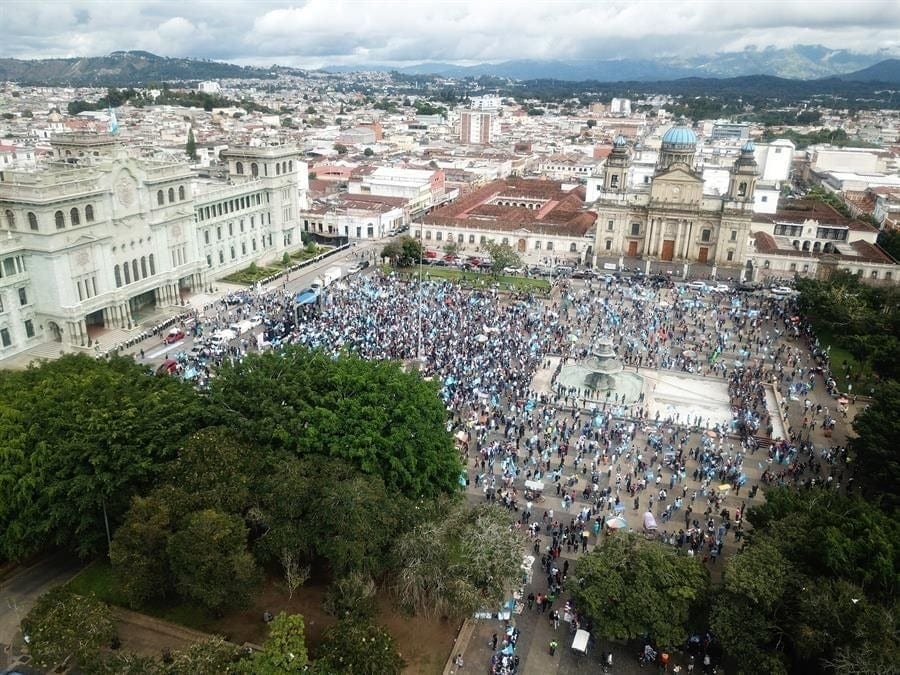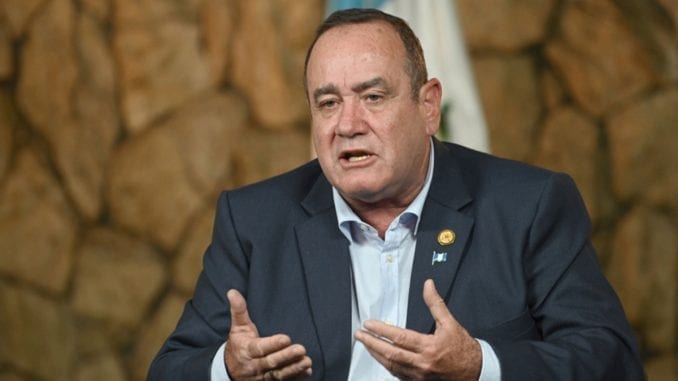On November 24, the independent non-governmental organization “Human Rights Watch” announced that the Guatemalan authorities should investigate and punish law enforcement officials who used force during peaceful protests by citizens of the country. What happened in this Latin American country? Why do thousands of Guatemalans take to the streets these days?
On November 21, protests erupted in Guatemala against the adoption of the new state budget for 2021. The day before, rioters set fire to the country’s parliament building. The protest was directed against the head of state Alejandro Giammattei (Spanish – Alejandro Eduardo Giammattei Falla) and his scandalous record budget for 2021, amounting to, according to official figures, almost $ 12.8 billion US dollars.
Turning to the indicators of previous years, it is worth noting that this amount exceeds by about a quarter of the last year’s figure. However, according to the draft budget, most of the money will go to infrastructure managed by private companies, rather than to combat high poverty in Guatemala. According to UN figures, 59% of the 17.25 million inhabitants of this Latin American country live below the poverty line, and about half of Guatemala’s children under the age of five are malnourished. The budget adopted by the National Congress significantly reduces funding for social programs on malnutrition, education, poverty, housing and health care, as well as limits the allocation of funds to the judiciary and the Ombudsman, which can seriously affect the functioning of these areas.
Popular protest exploded on the National Congress of Guatemala, in which the majority of seats are held by representatives of the center-right political party Giammattei – “Vamos”, which adopted the budget. After clashes with the police, a flame erupted inside the parliament building of the Latin American country. Several people were hospitalized as a result of smoke poisoning.
These days the protesters were supported by Guillermo Castillo (Spanish – Guillermo Castillo Reyes), Vice President of Guatemala, who, against the background of the events, turned to Alejandro Giammattei and asked the head of state to resign “for the good of the country”. In turn, on November 20, the country’s leader said that he did not intend to veto the budget approved by Congress.

In connection with this reaction of the head of state of Guatemala, thousands of citizens of the country took to the streets in protest on November 21. In the central part of the capital, where the protests were mostly peaceful, local media and the Ombudsman reported on the excessive use of force by the police, as a result of which at least 17 protesters were injured. The wounded were taken to the General Hospital of Guatemala. After the suppression of the protest march on November 21, the wave of social discontent spread to other cities and municipalities.
In the context of the protests, some Guatemalans acted violently: vandalism, looting and destruction of property, including the arson of the National Congress building. At least 37 people were arrested during protests in Guatemala City and other municipalities. On November 22, the Latin American country’s Ombudsman’s Office filed an appeal to conduct its own investigation on behalf of 23 inmates in the capital, on the basis that the detainees were illegally arrested and attacked by law enforcement officials.
On November 23, the chairman of the National Congress of Guatemala, Allan Rodriguez (Spanish – Allan Estuardo Rodríguez Reyes), assured that he would cancel the state budget for 2021. Rodriguez announced the decision in a pre-recorded message in the company of 16 other MPs from various political blocs associated with the ruling party, published at dawn on Monday via congressional communications. According to national media reports, the report was recorded at the headquarters of the Guatemalan Ministry of Defense, although authorities did not confirm this version, despite the insistence of journalists. In addition, the opposition MP Lucrecia Hernández Mack warned on her social media that, from a legal point of view, “neither the Governing Council (of Congress) nor its blocs have the authority to terminate a bill approved by the plenary meeting”, and called on the population not to be misled by the parliamentary authorities.

On November 23, the Guatemalan government appealed to the countries of the Organization of American States (OAS) with an appeal to support democracy in the country in the face of the threat of a “coup d’etat”. According to the Guatemalan leader, such actions are only a means by which minority groups seek to carry out a coup. According to the statement, the protesters, by their actions, forced the authorities to appeal to the international community to support the preservation of democracy in Guatemala through regional instruments.
On November 22, in a joint statement of donor countries contributing to the UN projects to develop the most vulnerable regions (Germany, Canada, Spain, the USA, France, Italy, UK, Switzerland, Sweden, the European Union and the Organization of American States) addressed the authorities of Guatemala and noted that it is especially important that all government institutions of the country conduct a dialogue with the population, as well as work constructively to strengthen the rule of law and improve the well-being of the nation and its citizens. The UN donor countries have called on the Guatemalan government to investigate the events of November 21 and bring to justice those responsible for inciting violence and using excessive force.
The UN appealed to all Guatemalans and offered to unite in search of agreed solutions, refrain from confrontational language and use every opportunity to achieve inclusive dialogue, and also recalled that the country not only plunged into a round of political crisis, but also suffers from the coronavirus pandemic, at that time how thousands of people are surviving the aftermath of Hurricanes “Eta” and “Iota”, which hit Central America since November 16. Both the UN and other international organizations have confirmed their readiness to support dialogue in the Latin American country in any way possible.
Whether the Guatemalan authorities will be able to cope not only with natural disasters, but also with a political “hurricane” will be shown in the coming days. Nevertheless, it is quite obvious that the current head of state will have to build a dialogue with the population, otherwise, the “hurricane” can not only expose the country’s acute social problems, but also lead to a protracted political crisis.


